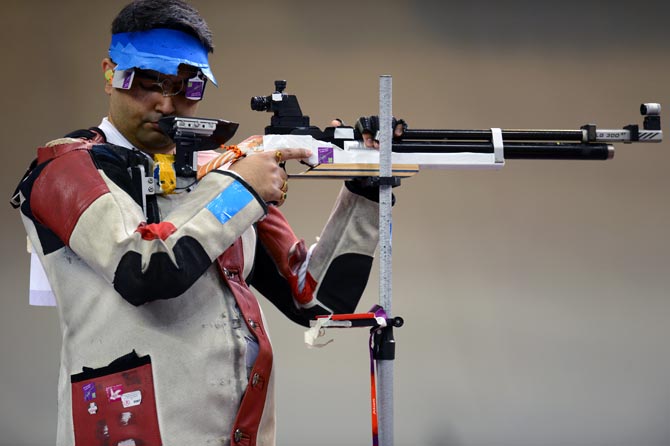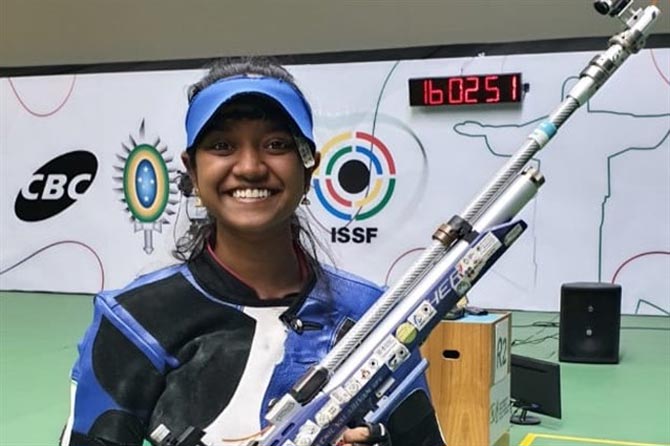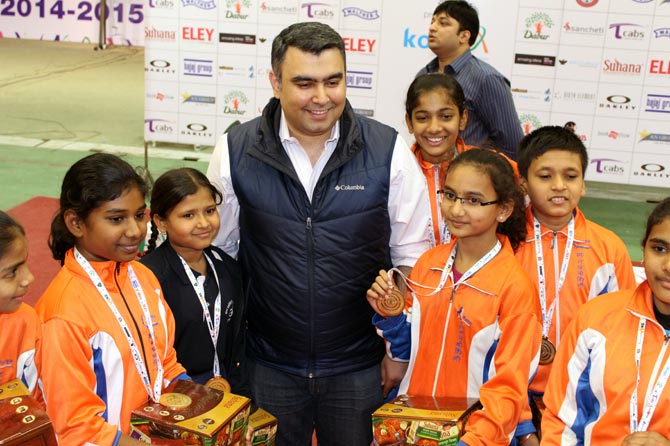 | « Back to article | Print this article |
'I have walked down the path and I hope that others who are following that path do not come empty-handed. I am hoping that the right kind of support is given to the academy and we are able to produce future champions.'

From a world-class shooter to producing World champion shooters himself, the transition has been quite smooth for Gagan Narang.
The 2012 London Olympics bronze medallist's Gagan Narang Sports Promotion Foundation (GNSPF) was recently conferred the Rashtriya Khel Protsahan Puraskar. It trains nearly 1000 shooters every year and has 15 centres across India, with the aim of mentoring future World and Olympic champions from the country.
Having gone through tough times when he started out as a shooter, Narang, 36, is leaving no stone unturned to ensure that his wards get the best of facilities to triumph at the highest level.
Last Thursday there was double joy for him as he received the Rashtriya Khel Protsahan Puraskar award from President Ram Nath Kovind: his ward Elavenil Valarivan had won the gold medal at the shooting World Cup in Rio de Janeiro.
Narang, who has won a medal at every major competition, like the Olympic Games, Asian Games, Commonwealth Games and World Cups, tells Rediff.com's Harish Kotian what made him start the foundation way back in 2011 when he was in the midst of his own shooting career.
The Gagan Narang Sports Promotion Foundation has been conferred the Rashtriya Khel Protsahan Puraskar. How satisfying is it for you when something you have worked for selflessly for the last eight years has been recognised?
All the awards are a form of motivation and recognition given for the efforts. This award makes it a little more special because it is not being given for my performance but for the performances of the foundation and the kids who have been winning medals internationally.
Also, because we have been able to broadase the sport, identify the right talent and nurture it to win medals for the country.
So it is coming back like a full circle almost, wherein in 2005 I won the Arjuna award and now getting the Rashtriya Khel Protsahan Puraskar for giving back to the sport.

Elavenil Valarivan's gold medal on the day you received the National award must have been the perfect icing on the cake for you. How special is it when your ward goes on to win medals on the world stage?
Elavenil is a special talent. She has combined talent and hard work to get this result in Rio. She was spotted through talent hunt in Sanskardham school in Ahmedabad and put into the Project Leap.
This was coming for some time. We aren't really surprised by her World Cup show. She has excelled at the junior level, won big medals. It was just about time that she replicated the effort at the senior stage.
If you saw the final, there were teenagers from other countries too. The average age of a shooter is getting younger. She has managed a smooth transition from junior to senior level because of her own efforts and the coaches who have constantly supported her endeavour.
It was sweet that she won on the same day that the academy got the Rashtriya Khel Protsahan Puraskar.
What made you start the foundation in 2011 while being an active shooter and taking part in competitions throughout the world?
I was always in a small little way giving back to the sport, whether it was lending my rifle to the shooters or whether it was guiding them or giving them tips and so forth.
But, when I was training in Pune, I met Pawan Singh and then we decided to give it a structure and do it properly. And that is when the foundation started. We tried to address the gaps in the system at a very lower level because at that point the shooters in the Indian team were getting what was required, but for people who were knocking on the doors of the Indian team similar facilities were not available.
We kind of thought why should the Indian shooters go abroad for training and spend so much money, why can't we get the coaches to the country and have a kind of system where we are able to provide the same kind of facilities at fraction of the cost.
And we were able to do it in the first year itself with the support of an NGO called Lakshya, which is Pune-based; at that point of time they supported us with Rs 20 lakh and we combined it with the money that I put in from the Commonwealth Games (2010) and put it into the venture.
We also got support from companies, like Walthers in Germany, and in Delhi and England. We were kind of able to subsidise the sport and make it more accessible.
People had this wrong notion that shooting is an expensive sport so we tried to change it a little bit in our own way and we were able to do that, more people started to come into the sport and then, of course, the technical guidance was there, with me being there along with the coaches.
Then it started producing the results eventually over the next 3-4 years and the shot in the arm came when OGQ (Olympic Gold Quest) decided to support Project Leap, which is one of our flagship projects of the academy and has won so many medals internationally.

As you said, the system started to produce results in three to four years' time. So, in the initial years, was it difficult sourcing funds to sponsor so many shooters, because you provide 100 percent funding to promising talents who are also trained by international coaches?
The funding is a constant problem because there are so many projects that require the right kind of support. If we are able to get the support, we are able to execute the projects in the right perspective and in the right way.
Now, for sports there is so much of talent and there is so much of work that any kind of funding can fall short; there is so much talent in the country.
But I hope that this award is also a kind of pat on the back that we are doing good work. I hope that the CSR (Corporate Social Responsibility) that the corporates have to fulfil trickles to this particular sector as well because sports comes down below in the priority list and I am not just talking about the sport of shooting but any sport in the country.
How many shooters are you training currently and how many centres do you have across the country?
We have a curriculum-based approach to the whole system and from that perspective we are training almost over 1000 shooters every year at different points of time. We have about 15 centres across the country, which includes franchises, includes own operated and also included tie-ups with the government.
Shooting is not a sport like cricket or football where you can just start playing in an open field. It needs a lot of infrastructure, like shooting ranges; that is why not everyone can take up shooting.
Infrastructure is only one part; first you have to build the infrastructure and then you have to provide the expenditure; so there is double expenditure in the sport.
Do you have any targets, like producing the next Olympic champion or world champion for the country?
Of course! That is the main goal: to produce an Olympic medallist from the academy besides me. I have walked down the path and I hope that others who are following that path do not come empty-handed. I am hoping that the right kind of support is given to the academy and we are able to produce future champions.
Did you also face a lot of hardship when you took up shooting and gradually continued to rise up the ranks? Is money a major problem in a sport like shooting, where the equipment is not only costly but also difficult to procure?
The Indian sporting system is all about hardships; sometimes you have to take it in a very positive because if these hardships were not there then probably you wouldn't bake in the oven; you would have it too easy and probably not value the system and work harder.
I would say hardships are part of any sportsperson's life; they are different kinds of hardships. When we were training, there were different kinds of challenges than people face than we face right now; so it is a mix. The sportsperson's attitude is always to be positive and take everything in their stride irrespective of the conditions.
I faced lot of hardship; you know me, personally. Starting from getting the right kind of guidance to getting the proper weapon was difficult when I started shooting. Now what we used to take three-four years to get, today the shooters get it in the first year itself. So they are quite fortunate that way.
And the system has also been built; the government has eased the rules and the federation has made things a lot easier, whether it is importing of pellets or importing of weapons. A lot of progress has happened, a lot of water has flowed under the bridge and things are looking really bright and we just have to keep the same going in the future as well.
Personally, how do you manage to balance your time between pursuing shooting professionally and also helping young shooters take the next step up in their career?
My focus has definitely been on my shooting when I am training and only in between when I take some time off, I am able to help the youngsters and guide them in the right away; so it is not a distraction for me at all.
You have been away from shooting for a while now, having taken a break of nearly a year-and-half. Will you come back or not? Is qualifying for the Tokyo Olympics still part of your plans?
I am enjoying the sport right now; I am shooting good at the moment. I am just following the process. And whether the process leads into an (Olympic) qualification or not is something that is still some time away. But, right now, I am just enjoying the sport. That is what I would like to stick to and not worry too much about the future.

But why the long break, when you are still looking to compete at the highest level?
I took a break because I was not particularly enjoying the sport. The break was also important because I wanted to spend time with my parents. I had neglected them quite a bit and their health was taking its toll, so I had to kind of get them back in shape and then get back to my sport, with a fresh perspective.
That kind of gives me the necessary break and I still feel like shooting and I enjoy the sport. So I will continue to shoot as long as I enjoy the sport whether it is good enough or not... what is good enough for me, only the future will tell.
You also seem to enjoy another kind of shooting... that is wildlife photography, in particularly tigers. Tell us more about that.
Yes, I do. If you see, the Project Leap logo is inspired from that only; it is the picture of a tiger taking a leap.
I have also contributed at some of the parks wherever I have gone to shoot pictures of tigers.
Photography unwinds me; it has taken a detour into the wildlife and I am enjoying it. So whenever I am free from my busy schedule I run to the jungle and do some photography.
Are you confident of India's chances in shooting at the Tokyo Olympics? Can we better our showing from London, when we won six medals, which includes two from shooting (Narang won a bronze in the 2012 Olympics)?
I feel we are in a good state of mind taking from Rio. We are in a better place if you take from Rio and, hopefully, the performances in the 2020 Tokyo Games will be much better.
As a shooter, how do you see the decision to drop shooting for the 2022 CWG? Indian shooters have done well in the last few Commonwealth Games -- winning 41 gold medals in the last four editions, in 2006, 2010, 2014 and 2018.
I have won 10 medals at the Commonwealth Games and it is unimaginable for me not to see shooting at the Commonwealth Games. There are so many shooters who are aspiring to win medals at the Commonwealth Games, so shooting not being part of the Commonwealth Games it is definitely a setback.
But, like I said, let it be any competition, from an athlete's perspective we have to give our best always. Commonwealth or no Commonwealth, you have the Asian Games, the World Championships, the World Cups and the Olympic Games, so the idea is to give our best irrespective of what the decision is. I am sure the decision-makers are pushing for it and I hope good sense prevails and shooting is part of the 2022 Commonwealth Games.